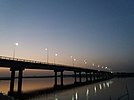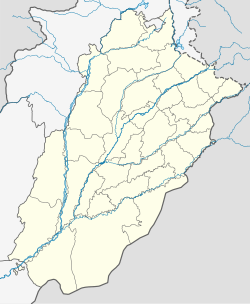Sahiwal
This article has multiple issues. Please help improve it or discuss these issues on the talk page. (Learn how and when to remove these messages)
|
Sahiwal
ساہِيوال | |
|---|---|
From top to bottom: Sahiwal Railway Station, Ravi Bridge, Chichawatni Forest, Sahiwal Medical College | |
| Coordinates: 30°39′40″N 73°6′30″E / 30.66111°N 73.10833°E | |
| Country | |
| Province | |
| Division | Sahiwal |
| District | Sahiwal |
| Government | |
| • Type | Metropolitan Corporation |
| Area | |
• City | 60 km2 (20 sq mi) |
| • Metro | 3,201 km2 (1,236 sq mi) |
| Elevation | 152.4 m (500.0 ft) |
| Population | |
• City | 389,605 |
| • Rank | 22nd, Pakistan |
| • Density | 6,500/km2 (17,000/sq mi) |
| Time zone | UTC+5 (PST) |
| Calling code | 040 |
| No. of Union Councils | 52 (11 urban, 41 rural)[1] |

Sahiwal (Punjabi and Template:Lang-ur), formerly known as Montgomery, is a city in Punjab, Pakistan. It is the 21st largest city of Pakistan by population and the administrative capital of both Sahiwal District and Sahiwal Division.[2] Sahiwal is approximately 180 km from the major city Lahore and 100 km from Faisalabad and lies between Lahore and Multan.[3] Sahiwal is approximately 152 meters above the sea level. [4]
The city lies in a densely populated region between the Sutlej and Ravi rivers. The principal crops are wheat, cotton, tobacco,[5] legumes, potato[6] and oil seeds. Cotton goods and lacquered woodwork are manufactured.[7][8]
History
Following the Ummayad Arab conquest of the Punjab cities of Uch and Multan, led by Muhammad bin Qasim. Arabs of the Emirate of Multan ruled the region of Sahiwal for few centuries. Then Sahiwal remained part of the Multan province of the Mamluk dynasty. Sahiwal also remained associated with historic city of Depalpur.[9]
The modern-day city of Sahiwal was founded in 1865 when a train station was built at the site of a small village on the Karachi-Lahore railway line. The site was named Montgomery for Sir Robert Montgomery, then lieutenant governor of the Punjab and it replaced Gogera as the capital of the recently created Montgomery district.[10] Two years later in 1867, it was constituted a municipality.[11]
In 1914 construction began of the Lower Bari Doab Canal which now irrigates both the city and wider region.[11]
During the Partition of India in 1947 the city, being part of Montgomery district, was allocated to Pakistan by the Punjab Boundary Commission. This was on the basis of being a Muslim-majority area, despite claims from the Indian National Congress and Sikh groups on the basis of greater property ownership and revenues paid to the state.[12]
Climate
The climate of Sahiwal district is extreme, reaching 52 °C in summer, and down to 2 °C in winter. The soil of the district is very fertile. The average rainfall is about 2000 mm.[13]
Education

Notable educational institutes of the city include:
- University of Sahiwal[14]
- COMSATS University, Sahiwal Campus
- Barani Institute of Sciences[15]
- Sahiwal Medical College
- Quaid-e-Azam College of Engineering and Technology, Sahiwal
- Punjab College of Science
- The Superior College
- Army Public Schools & Colleges System (APSCS)
- Beaconhouse School System
- Bloomfield Hall School
- The City School
- Divisional Public School and College
- The Educators
- Government Postgraduate College Sahiwal
- Government College of Technology Sahiwal
- Royal Computer Trainning Institute Sahiwal
Twin city
Sahiwal is twinned with the town of Rochdale, in Greater Manchester, North West England. Approximately eight per cent of town's population is of Asian origin, most of whom have links with Pakistan. The twinning arrangement was agreed between Rochdale and Sahiwal in 1998.[16][17]
Notable people
- Mushtaq Ahmed, former test cricketer
- Majeed Amjad, Urdu poet
- Tariq Aziz, television anchor
- H.K.L Bhagat, politician and former Union Minister of Parliamentary Affairs of India
- Dildar Pervaiz Bhatti, (TV artist, compere, comedian, anchor)
- Brigadier Kuldip Singh Chandpuri, Indian Army Officer
- Attash Durrani, Urdu writer and Scholar
- Manzoor Elahi, former test cricketer
- Mehdi Hasan, journalist and historian
- Rana Mohammad Hanif Khan, politician and former Finance Minister of Pakistan
- Nazir Naji journalist and Urdu columnist for various media groups.
- Emmanuel Neno, Christian author and translator
- Kunwar Mohinder Singh Bedi Sahar, Urdu Poet
- Nouraiz Shakoor, politician and former Federal minister
- Saieen Zahoor, Sufi musician
See also
References
- ^ a b "Table 209". Punjab Development Statistics 2016 (PDF). Bureau of Statistics, Government of The Punjab. p. 335(340). Retrieved 28 May 2017.
- ^ "Pakistan City & Town Population List". Tageo.com website. Retrieved 29 September 2017.
- ^ "Sahiwal to be connected with Lahore-Multan motorway". Dawn. April 10, 2021.
- ^ "District Sahiwal Official Website".
- ^ Agricultural Research Council (Pakistan) (1 January 1980). Pakistan journal of agricultural research. Pakistan Agricultural Research Council. Retrieved 18 July 2011.
- ^ Nazli, Caesar B. Cororaton, Abdul Salam, Zafar Altaf, David Orden and Reno Dewina, Nicholas Minot, Hina. Cotton-Textile-Apparel Sectors of Pakistan: Situations and Challenges Faced. Intl Food Policy Res Inst. p. 47. GGKEY:1W7L1FH7N4N. Retrieved 18 July 2011.
{{cite book}}: CS1 maint: multiple names: authors list (link) - ^ The New Encyclopædia Britannica: Micropædia. Encyclopædia Britannica. 1991. ISBN 978-0-85229-529-8. Retrieved 18 July 2011.
- ^ Cotton handbook of Pakistan. Pakistan Central Cotton Committee. 1983. p. 217. Retrieved 18 July 2011.
- ^ Firishtah, Muḥammad Qāsim Hindū Shāh Astarābādī; Dow, Alexander (1812). The History of Hindostan: Translated from the Persian ... J. Walker.
- ^ "Montgomery District, Imperial Gazetteer of India, v. 17, p. 410., 1860–1922". Dsal.uchicago.edu. Retrieved 2013-02-18.
- ^ a b "Sahiwal". www.britannica.com. Retrieved 17 January 2021.
- ^ Ranjan, Amit (20 November 2018). Partition of India Postcolonial Legacies. Taylor & Francis. ISBN 9780429750526.
- ^ "Govt. Post Graduate College Sahiwal". Gpgcs.edu.pk. Retrieved 2017-11-08.
- ^ "University of Sahiwal".
- ^ "Barani Institute of Sciences".
- ^ "Punjab Assembly". Pap.gov.pk. Retrieved 2010-03-24.
- ^ "Town twinning". rochdale.gov.uk. Archived from the original on 29 October 2007. Retrieved 8 August 2016.







